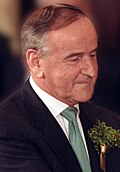| | First party | Second party | Third party |
|---|
| | | | Green | | Leader | Albert Reynolds | John Bruton | None |
|---|
| Party | Fianna Fáil | Fine Gael | Green |
|---|
| Alliance | EDA | EPP | Green Group |
|---|
| Leader since | 6 February 1992 | 20 November 1990 | 6 November 2001 |
|---|
| Last election | 31.5%, 6 seats | 21.6%, 4 seats | 7.9%, 2 seats |
|---|
| Seats won | | | |
|---|
| Seat change |  1 1 |  2 2 |  0 0 |
|---|
| Popular vote | 398,066 | 276,095 | 90,046 |
|---|
| Percentage | 35.0% | 24.3% | 7.9% |
|---|
| Swing |  3.5 pp 3.5 pp |  2.7 pp 2.7 pp |  4.2 pp 4.2 pp |
|---|
| | | Fourth party | Fifth party | Sixth party |
|---|
| | | | | | Leader | Dick Spring | Mary Harney | Proinsias De Rossa |
|---|
| Party | Labour | Progressive Democrats | Democratic Left |
|---|
| Alliance | PES | ELDR | |
|---|
| Leader since | 1 November 1982 | 12 October 1993 | 1992 |
|---|
| Last election | 9.5%, 1 seats | 12.0%, 1 seats | New |
|---|
| Seats won | | | |
|---|
| Seat change |  0 0 |  1 1 | New |
|---|
| Popular vote | 124,972 | 73,696 | 39,706 |
|---|
| Percentage | 11.0 % | 6.5 % | 3.5% |
|---|
| Swing |  1.5 pp 1.5 pp |  5.5 pp 5.5 pp | New |
|---|
| | | Seventh party | Eighth party |
|---|
| | | Workers' | | Leader | Gerry Adams | Marian Donnelly |
|---|
| Party | Sinn Féin | Workers' Party |
|---|
| Alliance | NI | |
|---|
| Leader since | 13 November 1983 | 11 November 1988 |
|---|
| Last election | 2.2%, 0 seats | 7.7%, 1 seats |
|---|
| Seats won | | |
|---|
| Seat change |  |  1 1 |
|---|
| Popular vote | 33,823 | 22,100 |
|---|
| Percentage | 3.0% | 1.9% |
|---|
| Swing |  0.8 pp 0.8 pp |  5.8 pp 5.8 pp |
|---|
|






